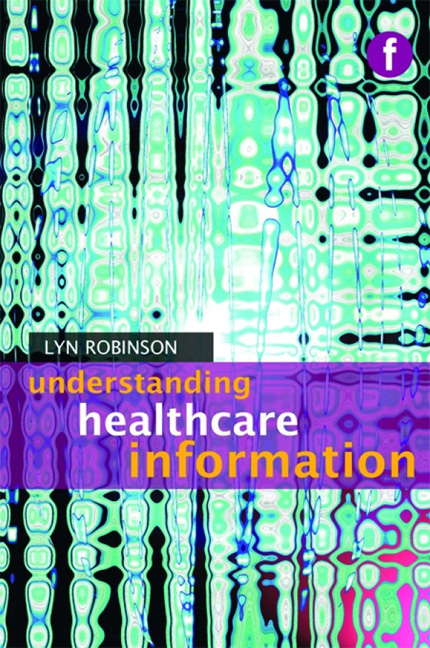Book contents
- Frontmatter
- Contents
- Acronyms and abbreviations
- Introduction
- 1 The healthcare information domain
- 2 History of healthcare and its information environment
- 3 Producers and users of healthcare information
- 4 Healthcare information organization
- 5 Healthcare information sources, services and retrieval
- 6 Healthcare Information and knowledge management
- Afterword
- Index
5 - Healthcare information sources, services and retrieval
Published online by Cambridge University Press: 09 June 2018
- Frontmatter
- Contents
- Acronyms and abbreviations
- Introduction
- 1 The healthcare information domain
- 2 History of healthcare and its information environment
- 3 Producers and users of healthcare information
- 4 Healthcare information organization
- 5 Healthcare information sources, services and retrieval
- 6 Healthcare Information and knowledge management
- Afterword
- Index
Summary
Introduction
Healthcare information resources are diverse and very numerous. It is therefore not possible to give anything approaching a complete list here, nor to produce a list of the ‘best’ resources, since healthcare is a dynamic domain and its resources change over time.
The nature of guides to healthcare resources has also changed as the extent and diversity of these resources has increased, as is clearly shown by the multiedition series of guides edited by Leslie Morton. In the first edition (Morton, 1974), the editor's statement was that:
The book attempts to provide a comprehensive guide to the general and specialized literature covering the medical sciences … limitations of space have not permitted a separate chapter for every branch of medicine, but readers will find that several of the contributors have covered their subjects very broadly.
By the fourth edition (Morton and Godbolt, 1992), the attempt at comprehensive coverage had been abandoned:
This book is intended to serve as an evaluative guide to the most important sources of information that each contributor has recommended from experience of the subject, rather than as a directory of sources.
Morton and Godbolt's 1992 guide was the last of its kind. Since then, guides either have been restricted to specific subjects within healthcare, for example Snow's (2008) guide to pharmacy resources, or have been devoted to finding knowledge for evidence-based practice, for example De Brún and Pearce- Smith's (2009) ‘toolkit’. These latter may emphasize analysis and evaluation of information as much as, or more than, resources (see, for example, Guyatt, Rennie, Meade and Cook, 2008).
Morton and Goldbolt's book stands as an excellent and thorough account of the information sources in healthcare and the health sciences just before the advent of the internet, which has been one of the major drivers for change. It is still worth consulting, to get an understanding of the nature of the ‘traditional’ sources in the domain.
Since it is not possible to enumerate all resources, or the ‘best’ resources, we will focus here on an explanation of the types of resources available and their purpose, value and significance, giving examples for each. The examples will sometimes be the best known or most widely used, of their kind, but often will just be ‘typical’ examples.
- Type
- Chapter
- Information
- Understanding Healthcare Information , pp. 133 - 184Publisher: FacetPrint publication year: 2010



